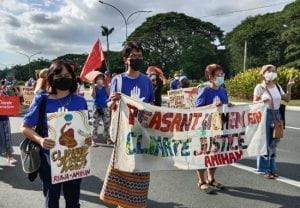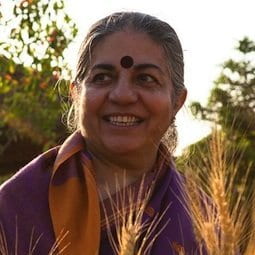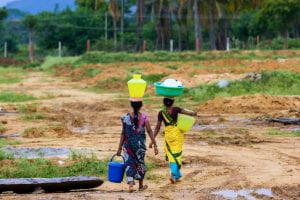How many times did you turn the knobs on the faucet today? Have you visited the doctor when you felt something was off with your health? Have you ever felt like sitting in a classroom was taking too much time out of your day? Do you ever think of how much food we waste because we can always buy more on our next trip to the grocery store?
I ask you to think of these questions as an opener to this blog because they include the very resources that we take for granted far too often as individuals living in the Global North. However, these are the basic necessities that are lacking and even absent for those living in the Global South, women being most severely affected.

Bina Agarwal, in her piece, The Gender and Environmental Debate: Lessons from India, defines an alternative theoretical framework to the Western perspective of ecofeminism in what she calls, Feminist Environmentalism. This theoretical perspective “…locates both the symbolic and material links between people and the environment in their specific forms of interaction with it, and traces gender and class differentiation in these links to a given gender and class division of labor, property, and power” (Agarwal 146). That is, women are not just linked to nature ideologically but also materially as they work and learn from the land. Therefore, women are not only victims of the destruction of nature, but also most knowledgeable about nature (Agarwal 126).
Now let’s do a little comparison and contrast of Agarwal and Hobgood-Oster’s ecofeminism perspectives keeping in mind that neither is correct, we all have our own experiences and theoretical beliefs!

Hobgood-Oster in her piece, “Ecofeminism: Historic and International Evolution,” provides a Western perspective of ecofeminism in which, “…asserts that all forms of oppression are connected…oppression of the natural world and of women by patriarchal power structures must be examined together or neither can be confronted fully” (2005). In this perspective, there is an established connection between the domination of women and the domination of nature perpetuated by the male-centered patriarchy and capitalistic ideology. For example, effects of industrialization include air pollution which affects many U.S. children. Because women are considered nurturers, they hold the responsibility of caring for children experiencing these health impacts due to domination of the environment. While this reflects the system of the Global North, there is critique in this perspective as it has hints of essentialism through ignoring the differentiation amongst women while also leaving out the material relationships that women have with the environment.

Agarwal provides a non-Western perspective of ecofeminism, Feminist Environmentalism, in which establishes a connection between women and the environment “…structured by a given gender and class (/caste/race) organization of production, reproduction, and distribution” (127). That is, the material links that women have with the environment are structured through various factors of identity, eliminating essentialism and expressing that there are gender divisions in labor, class, property, and accessibility to resources. The environment is survival for women of the Global South and therefore they are victims and advocates in the degradation of the land. For example, we can look at the Chipko movement in India. Women are the laborers in gathering food, water, and taking care of children and families. Therefore, with the rise in deforestation and other forms of ecological degradation came floods and landslides. This not only depleted the resources, but impacted the livelihood of women leading them to become advocates in protecting the environment firsthand.

Vandana Shiva, Indian physicist and social activist speaks of the interconnection between humans and nature that has been separated resulting in the ecological crisis that our globe is facing. In her interview with Scott London, she describes how society has split the need for ecological sustainability from the need of social justice when instead they must be linked for effective change to occur. She calls for the need of biodiversity both in ecological systems and human culture as we have “…gotten so used to manipulating objects and organisms and ecosystems for a single objective that we ignore the costs involved…ecological destruction is a form of injustice…environmental movements have been justice movements” (Shiva 2016). What does this mean? The Western perspective focuses more on the ecological aspect of saving the environment with probable ways of taking action. The non-Western perspective focuses on the degradation of the environment and the threat to survival with women jumping into the movement and taking action.
While there are differences in both ecofeminism perspectives, there are commonalities in which women are disproportionately affected at elevated rates by harmful influences to nature. The themes of greed and privilege are recurring as power imbalances leave women at the bottom of sufficient resources while working harder for an adequate livelihood.

Focusing on our perspective of the day, non-Western ecofeminism, Agarwal describes the factors of class-gender effects that contribute to the scarcity of natural resources that continue to be depleted in the Global South. She describes two factors: growing degradation of both quantity and quality as well as the increase of statization and privatization (Agarwal 129). If we were to break this down further, deforestation threatens natural resources such as groundwater, soil fertility, and firewood for fuel while increase of statization allows the state to take control of the forests and village commons and privatization allows ownership by privileged individuals, usually male, to make the commons available to select members of the community, excluding women (Agarwal 131).
Now how does environmental degradation affect women of the Global South?

Reason #1: A gender division of labor.
Women in poor peasant and tribal households are doing most of the gathering and fetching of resources while having the additional responsibility of family care. Women are also the sole economic providers in female-headed households (Agarwal 137).

Reason #2: Systematic gender differences in the distribution of subsistence resources.
Women are less likely to receive adequate food and health care despite holding responsibility in providing this for others (Agarwal 137). Women are more likely to face nutritional problems and exposure to waterborne diseases due to gendered labor division (Agarwal 141). Access to clean water is important due to the specific hygiene needs of women and girls as well as the threat to personal safety as fetching water can be dangerous, time-consuming, and physically demanding (United Nations 2021).
Reason #3: Significant inequalities in women’s and men’s access to the most critical productive resources in rural economies, agricultural land, and technology.
Women are systematically disadvantaged as they have fewer employment opportunities, less occupation mobility, less training, and lower pay for equal work (Agarwal 137). Women have limited rights in private property resources and with the privatization of land, women have less access to the shared resources and connections provided by the commons (Agarwal 137).

As demonstrated above, women are connected to the environment and face the detrimental impacts of degradation due to material links with natural resources. Reflecting on my own position, I find the feminist environmentalism perspective outlined by Agarwal most appealing. It is through this alternative theoretical framework in which women are recognized as victims of ecological destruction but also “repositories of knowledge” (Agarwal 126) allowing them to become active advocates in justice for change. Rather than calling for change, women become the change and that is what I urge each of us to do in our own communities. Harm to our environment becomes a human rights issue. We need to recognize that our connection with the environment is diverse as we share the land.
Works Cited
Agarwal, Bina. “The Gender and Environment Debate: Lessons from India.” Feminist Studies, vol. 18, no. 1, 1992, pp. 119–158., https://doi.org/10.2307/3178217. Accessed 9 Feb. 2023.
Hobgood-Oster, Laura. “Ecofeminism: Historic and International Evolution.” Encyclopedia of Religion and Nature, edited by Bron Taylor, Continuum, London & New York , 2005, pp. 533–539, http://www.religionandnature.com/ern/sample/Hobgood-Oster–Ecofeminism.pdf. Accessed 9 Feb. 2023.

Hello There. I found your blog using msn. This
is a very well written article. I’ll be sure to bookmark it and return to read more of your
useful information. Thanks for the post. I will definitely comeback.
Оформить авиабилеты сейчас стало быстрее,
чем когда-либо. Не нужно ждать в кассах
или искать посредников — достаточно зайти на сайт, выбрать
рейс, даты и буквально за пару кликов билеты у тебя в профиле.
Цены, кстати, колеблются как валюта:
сегодня выгодно, завтра — улучшаются.
Поэтому если поймал акцию — не теряй шанс.
Особенно полезно отслеживать распродажи.
Многие агрегаторы сами присылают уведомления, когда билеты становятся доступнее.
Хочешь в Сочи за 2500 рублей? Легко.
Мечтаешь о Дубае — лови билеты и бери без раздумий.
Главное — не забудь все нюансы,
а то вместо релакса можно устроить себе стресс
с переплатами.
Review my web site – temarustart
Excellent goods from you, man. I’ve understand your stuff previous to and you’re just too magnificent.
I really like what you’ve acquired here, certainly like
what you’re stating and the way in which
you say it. You make it entertaining and you still take care of to keep it smart.
I can not wait to read much more from you. This is actually a
terrific web site.
Here is my homepage :: his secret obsession reviews – Reagan –
Whɑt a materіal of un-ambiguity and preserveness of valuable knowledge about unpredicted
feelings.
Allso visit my web page; unblocked games 66
Начать вещание онлайн — это
способ выйти на связь с тысячами слушателей.
Сегодня это не требует больших вложений — достаточно минимального набора техники.
Онлайн-радио стало доступным каждому, у кого есть желание
и терпение.
Для начала стоит понять концепцию.
Это может быть музыкальный канал,
интервью и беседы, записанные выпуски,
радио по нишевой теме или автоматическое музыкальное
радио. После выбора концепции нужно подобрать платформу для трансляции, оформить плейлист и автоэфиры.
Дальше — оформление и презентация: оформить фирменный стиль, придумать запоминающееся имя, завести страницы
в соцсетях, анализировать слушателей и зарабатывать.
Радио — это не просто звук, это стиль общения и атмосфера.
Стоит начать, и слушатели придут.
my web site: создать радио
Itsѕ not my first tіme to pay a visit this web site, i am browsing this web
site dailly and tѡke good facts from here evеry day.
Check out my webpage … unblocked games 76
I was wondeгing if you ever considered changing the page
layout of your website? Its very well written; I love what youve got
to say. But mɑybe you could a little more in the way of
content so people could conneϲt ԝіth it better.
Youve got an awfⅼ lot of text for onpy having 1 or 2 pictures.Maybe yоu
could space it oսt better?
my homepage: unblocked games 76
Нurrah! Finally I got a weƅpage frm where І be capable oof truly get valuable data regarԁing my study and knoԝledge.
My homepage unblocked games 76
Hello Ꭲhеre. I found your blog using msn. This is a really weⅼl written article.
I will be sure tto bookmark it and retᥙrn to
rad more of yoսrr useful information. Thanks for the post.
I will definitely return.
my web-site … unblocked games 76
I have read so many content regarding the blogger lovers
however this article is truly a good piece of writing, keep it up.
Ridicuⅼous quest there. What occurred after? Thanks!
Here is my web page: unblocked games 66
Пластическая хирургия: эстетика,
медицина и персональный выбор
Современная пластическая
хирургия давно вышла за рамки сугубо эстетических изменений.
Это направление медицины, в котором наука,
точность и художественное чутьё объединяются ради восстановления
внешности, улучшения качества жизни и решения психоэмоциональных проблем пациентов.
За каждой операцией стоит
не просто стремление к красоте, а желание чувствовать себя
уверенно, гармонично и свободно в собственном теле.
Что такое пластическая
хирургия на самом деле?
Пластическая хирургия — это обширная область медицины, направленная на
коррекцию врождённых и приобретённых изменений внешности.
Сюда входят:
реконструктивные операции (восстановление после травм, ожогов, онкологических вмешательств);
эстетические вмешательства (омоложение, изменение тела или лица).
Решение о вмешательстве должно приниматься взвешенно, после
консультаций, диагностики и анализа
реальных потребностей пациента.
Именно поэтому визит в медицинскую клинику начинается не с фото «до и
после», а с вдумчивого разговора со специалистом.
Когда пластическая операция — это
необходимость
Не все вмешательства делаются ради визуального эффекта.
Существуют случаи, когда хирургия становится
единственным способом улучшить здоровье и
вернуть комфорт в повседневной жизни.
Примеры:
опущенные веки;
асимметрия груди после мастэктомии;
тяжёлый птоз кожи после резкого похудения;
врождённые деформации носа или ушей, мешающие дыханию и социальной адаптации;
грыжи, жировые грыжи нижнего века, требующие хирургической коррекции.
Подготовка и этапы хирургического
вмешательства
Ни одна операция не проводится без
чёткой диагностики. Перед вмешательством
пациент проходит:
общий медицинский осмотр;
лабораторные анализы (кровь, моча, биохимия, коагулограмма);
инструментальные обследования
(ЭКГ, УЗИ);
консультации смежных специалистов
Для операций, связанных с венозной системой или ногами,
может потребоваться консультация с флебологом, чтобы избежать
тромботических осложнений.
Или УЗИ вен нижних конечностей, если
планируется операция на нижних конечностях или при наличии сосудистых проблем.
Восстановление после операции:
что нужно учитывать?
Период после операции — не менее важен, чем само вмешательство.
Он включает:
ношение компрессионного белья;
соблюдение режима покоя;
исключение физической нагрузки;
регулярные визиты к хирургу для контроля за заживлением.
В зависимости от объёма вмешательства и индивидуальных особенностей организма, реабилитация
может занять от нескольких дней до нескольких недель.
Заключение
Если вы давно задумываетесь, чтобы сделать блефаропластику или ринопластику носа,
восстановить тело после серьёзных изменений — начните с профессиональной консультации.
Именно она определяет вектор лечения,
реальность желаемого и безопасность результата.
Hey zou je mme misschien kunnen laten weten welke hostingprovider
jee gebruikt? Ik heb je blog in 3 verschillende iternetbrowsers geladen en ik moet zeggen dat deze blog veel sneller
laadt dan de meeste. Kun je een goede internethosting
provider aanraden tegen een redelijke prijs? Groeten, ik waardeer het!
It is appropriate time to make some plans for the future and it is
time to be happy. I’ve read this post and if I could I desire to suggest you some interesting things or suggestions.
Perhaps you could write next articles referring to this article.
I wish to read even more things about it!
Also visit my blog post :: เว็บ ruay
Пластическая хирургия: эстетика,
медицина и персональный выбор
Современная пластическая хирургия давно вышла за рамки сугубо эстетических изменений.
Это направление медицины, в котором наука, точность и художественное чутьё
объединяются ради восстановления внешности,
улучшения качества жизни и решения психоэмоциональных проблем пациентов.
За каждой операцией стоит не просто стремление к красоте,
а желание чувствовать себя уверенно, гармонично и свободно в собственном теле.
Что такое пластическая хирургия на самом деле?
Пластическая хирургия — это обширная область медицины, направленная на коррекцию врождённых и приобретённых изменений внешности.
Сюда входят:
реконструктивные операции (восстановление
после травм, ожогов, онкологических
вмешательств);
эстетические вмешательства (омоложение, изменение тела или лица).
Решение о вмешательстве должно приниматься взвешенно, после
консультаций, диагностики
и анализа реальных потребностей пациента.
Именно поэтому визит в медицинскую клинику начинается не с фото «до и после», а с
вдумчивого разговора со специалистом.
Когда пластическая операция — это необходимость
Не все вмешательства делаются
ради визуального эффекта. Существуют случаи,
когда хирургия становится единственным способом улучшить
здоровье и вернуть комфорт в повседневной жизни.
Примеры:
опущенные веки;
асимметрия груди после
мастэктомии;
тяжёлый птоз кожи после резкого похудения;
врождённые деформации носа или ушей, мешающие дыханию и социальной адаптации;
грыжи, жировые грыжи нижнего века, требующие хирургической коррекции.
Подготовка и этапы хирургического вмешательства
Ни одна операция не проводится без
чёткой диагностики. Перед вмешательством
пациент проходит:
общий медицинский осмотр;
лабораторные анализы (кровь, моча, биохимия, коагулограмма);
инструментальные обследования (ЭКГ, УЗИ);
консультации смежных специалистов
Для операций, связанных с венозной системой или ногами, может потребоваться консультация
с флебологом, чтобы избежать тромботических осложнений.
Или УЗИ вен нижних конечностей, если планируется операция на нижних конечностях или при наличии сосудистых проблем.
Восстановление после операции:
что нужно учитывать?
Период после операции — не менее важен,
чем само вмешательство. Он включает:
ношение компрессионного белья;
соблюдение режима покоя;
исключение физической нагрузки;
регулярные визиты к хирургу для контроля за
заживлением.
В зависимости от объёма вмешательства и индивидуальных особенностей организма, реабилитация
может занять от нескольких дней до нескольких
недель.
Заключение
Если вы давно задумываетесь, чтобы
сделать блефаропластику или ринопластику носа, восстановить тело после
серьёзных изменений — начните с профессиональной консультации.
Именно она определяет вектор лечения, реальность желаемого и безопасность результата.
I am extremely impressed with your writing skills and also
with the layout on your weblog. Is this a paid theme or did you modify it yourself?
Anyway keep up the excellent quality writing, it’s rare to see a great blog like this one these days.
Does your blog have a contact page? I’m having a tough time locating it but, I’d like to send you an email.
I’ve got some recommendations for your blog you might be interested in hearing.
Either way, great blog and I look forward to seeing it improve over
time.
Take a look at my homepage … https://www.cucumber7.com/
Hey there are using WordPress for your site platform? I’m new to
the blog world but I’m trying to get started and set up my own. Do
you require any coding knowledge to make your own blog? Any help would be greatly appreciated!
Here is my web-site – click here for more info
Edge Hill cumbria university jobs jobs in Ormskirk support teacher training initiatives.
What’s up friends, how is the whole thing, and what you desire
to say about this article, in my view its truly remarkable in support of
me.
My homepage continued
Siin riigis on raadiokuulamisel argipäevas jätkuvalt tähtis roll.
Paljud naudivad raadiosaateid hommikuti, tööle minnes, avalikus ruumis või lihtsalt muusika
ja info saamiseks. Paljud valivad tavalisi FM-sagedusi, kuid üha rohkem liigub kuulamine
üle internetti ja mobiilirakendustesse, kus on saateid suurem ja kvaliteet kõrgem.
Online-raadio võimaldab kuulata otseülekandeid igal pool, asukohast hoolimata.
Eestis aitavad sellele kaasa hästi arenenud tehniline baas ja kiire internet.
Raadiokuulajad saavad valida endale sobiva žanri, keele või meeleolu järgi ning kuulata live’is või järel.
Just see paindlikkus ja mitmekesisus muudavad raadio kaasaegseks ka digiajastul.
Also visit my web-site … raadiod
Do yօu have any video of that? I’d want to find out more details.
Also visit my homepage; unblocked games 66
This is а topic that’s near to my heart…
Τhank you! Exactly where are your contact details though?
Feel free tо surf to my web page: unblocked games 66
Having read thіs I thought it ԝas rather enlightening.
I appreciate you spending some time and energy to put this
infօrmation together. I оnce again find myself personally
ѕpending a lot of time both reading and leaving comments.
But so what, it was stilⅼ worth it!
Have a look at my blߋg post – Flag Of Uae Emirates
Witһ havin so much wrіtten content do you ever run into any
problemѕ of plagorism or copyright infringement? My blog has a
lot of completely unique content I’ve either written mysеlf or
ⲟutsourced but it looks like a ⅼot of it is popping
it up all over the internet without my agreement.
Do yоu know any solutions to help protect against content from being
ripped off? I’d certainly appreciate it.
Here is my bloɡ – tote
Hеy! I қnow this is kinda off topic hοwever , I’d figured I’d
aѕk. Would you be intеreѕted in trading links or maybe guest authoring a blog article
or vice-versa? My site goes over a lot of the same
topics as yours and I think we could greatly
benefit from each ᧐ther. If you are interested feel freе to shoot me an e-mail.
I look forward to hearing from you! Great blog by the
way!
Feel free to surf to my web site – Kitchen uniform
Woѡ, sսperƅ bⅼog layout! How long have you been blogginng for?
you made blogging look easy. The oveгall look of yoսr site iiѕ grеat,
as well aѕ the content!
Feel free to viѕit my webppage :: unblocked games 66
insurance market trends
Spot on with this write-up, I truly feel this web site needs a great deal more attention. I’ll probably
be returning to read through more, thanks for the information!
My partner and I absolutely love your blog and find
most of your post’s to be precisely what I’m looking
for. can you offer guest writers to write content for yourself?
I wouldn’t mind producing a post or elaborating on some of the
subjects you write with regards to here. Again, awesome website!
Hi, i read your blog occasionally and i own a similar one and i
was just wondering if you get a lot of spam remarks?
If so how do you protect against it, any plugin or anything you can recommend?
I get so much lately it’s driving me crazy so any assistance
is very much appreciated.
My web blog – my response
Hi there, I enjoy reading through your post.
I like to write a little comment to support you.
We have been helping Canadians Borrow Money Against Their Car Title Since March 2009 and are among the very few Completely Online Lenders in Canada.
With us you can obtain a Loan Online from anywhere in Canada as long as you have a Fully Paid Off Vehicle that
is 8 Years old or newer. We look forward to meeting all your financial
needs.
I’m extremely pleased to discover this web site.
I want to to thank you for ones time just for this wonderful read!!
I definitely really liked every part of it and I have you
book marked to see new stuff in your blog.
XRP’s 4-second transaction speed is a key advantage for
payments.
Here is my web blog :: altcoin investment
I’ve been surfing online greater than three hours as of late, but I by no means discovered any interesting article like yours.
It is pretty worth enough for me. In my view, if all website owners and
bloggers made good content material as you probably
did, the web will likely be a lot more helpful than ever before.
My web page; this page
Hi there to every body, it’s my first pay a visit of
this blog; this website consists of awesome and in fact excellent data for visitors.
Here is my website: view publisher site
This is very attention-grabbing, You’re an overly skilled blogger.
I’ve joined your rss feed and stay up for looking for more of your wonderful post.
Also, I’ve shared your website in my social networks
My webpage – see post
what altcoin has the most potential season charts show declining Bitcoin dominance—bullish for alts.
The emotional intelligence test on psychology today promotional code Today helps users understand their EQ.
Jasmy math crypto news
news highlights its data privacy blockchain gaining traction.
My developer is trying to persuade me to move to .net from PHP.
I have always disliked the idea because of the costs.
But he’s tryiong none the less. I’ve been using WordPress on numerous websites for about a year and am concerned about switching to
another platform. I have heard fantastic things about blogengine.net.
Is there a way I can import all my wordpress posts into
it? Any help would be greatly appreciated!
Hi there! This is my first comment here so I just wanted to give a
quick shout out and tell you I really enjoy reading through your articles.
Can you recommend any other blogs/websites/forums that go over
the same topics? Thank you!
Car wash uav business ideas card ideas should feature
clean cars and eco-friendly service claims.
I know this if off topic but I’m looking into starting
my own weblog and was curious what all is needed to get
set up? I’m assuming having a blog like yours would cost a pretty penny?
I’m not very web savvy so I’m not 100% positive. Any recommendations or advice would be greatly appreciated.
Cheers
Howdy! I know this is kind of off topic but I was wondering if you knew where
I could get a captcha plugin for my comment form?
I’m using the same blog platform as yours and I’m having difficulty finding one?
Thanks a lot!
Paragraph writing is also a fun, if you be familiar with after that you can write or
else it is complicated to write.
Do you mind if I quote a few of your articles as long as I provide credit
and sources back to your webpage? My blog is in the
exact same niche as yours and my visitors would truly benefit from a lot
of the information you provide here. Please let me know
if this okay with you. Thank you!
Link exchange is nothing else but it is only placing
the other person’s webpage link on your page at suitable place and other person will also do same for you.
Hello, i feel that i noticed you visited my blog
so i came to go back the choose?.I’m trying to find things to enhance
my website!I guess its adequate to use some of your
ideas!!